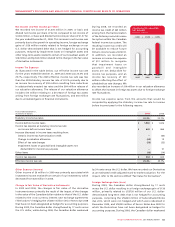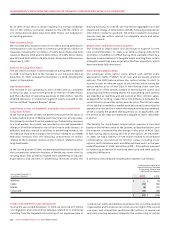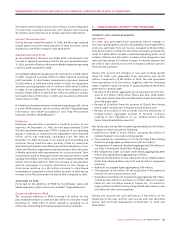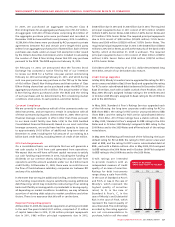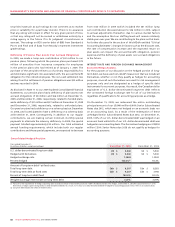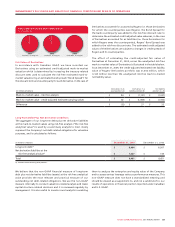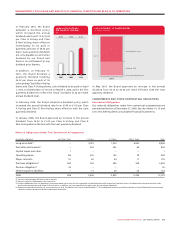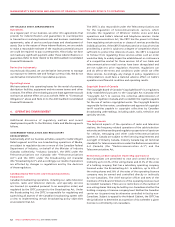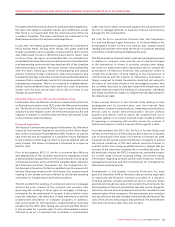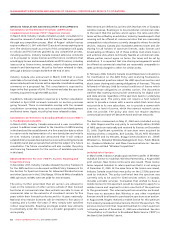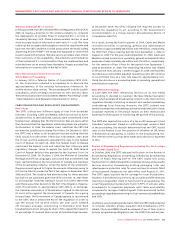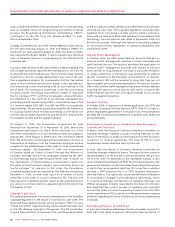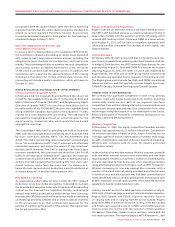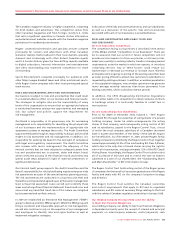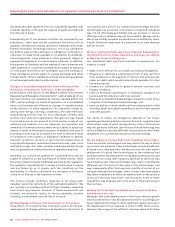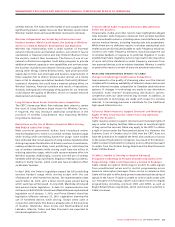Rogers 2009 Annual Report Download - page 49
Download and view the complete annual report
Please find page 49 of the 2009 Rogers annual report below. You can navigate through the pages in the report by either clicking on the pages listed below, or by using the keyword search tool below to find specific information within the annual report.
ROGERS COMMUNICATIONS INC. 2009 ANNUAL REPORT 53
MANAGEMENT’S DISCUSSION AND ANALYSIS OF FINANCIAL CONDITION AND RESULTS OF OPERATIONS
Pursuant to the Telecommunications Act and associated regulations,
the same rules apply to Canadian carriers such as Wireless, except
that there is no requirement that the chief executive officer be
a resident Canadian. The same restrictions are contained in the
Radiocommunication Act and associated regulations.
In July 2007, the federal government appointed the Competition
Policy Review Panel. Among other things, this panel examined
foreign ownership rules in Canada’s communications sector and in
June 2008 issued its report. While this panel and its report have
no force of law, the report recommended that non-Canadians be
permitted to start new telecommunications carriers in Canada and to
purchase existing carriers which have less than 10% of the Canadian
telecommunications market. The report further recommends that
after five years, following a review of broadcasting and cultural
policies including foreign investment, telecommunications and
broadcasting foreign ownership restrictions should be liberalized in
a manner that is competitively neutral for telecommunications and
broadcasting companies. There is no certainty of implementation.
Similar recommendations have been made as a result of previous
studies over the past several years which did not result in any
changes by government.
Policy Direction to the CRTC on Telecommunications
In December 2006, the Minister of Industry issued a Policy Direction
on Telecommunications to the CRTC under the Telecommunications
Act. The Direction instructs the CRTC to rely on market forces to the
maximum extent feasible under the Telecommunications Act and
regulate, if needed, in a manner that interferes with market forces
to the minimum extent necessary.
Proposed Legislation
The House of Commons was prorogued on December 30, 2009 which
means all Government legislation currently on the Order Paper
dies. It does not impact Private Members Bills. However, as was the
case in the last two prorogations, it is possible to return legislation
to the Commons at the stage at which it was last debated with all
party consent. The House of Commons is scheduled to re-open on
March 3, 2010.
Prior to prorogation, Bill C-27, An Act to promote the efficiency
and adaptability of the Canadian economy by regulating certain
activities that discourage reliance on electronic means of carrying out
commercial activities, and to amend the Canadian Radio-television
and Telecommunications Commission Act, the Competition Act,
the Personal Information Protection and Electronic Documents Act
and the Telecommunications Act (Anti-Spam Act), passed second
reading in the Senate and was referred to the Senate Standing
Committee on Transportation and Communications.
This Bill prohibits the sending of commercial electronic messages
without the prior consent of the recipient and provides rules
governing the sending of those types of messages, including a
mechanism for the withdrawal of consent. It also prohibits other
practices relating to the alteration of data transmissions and the
unauthorized installation of computer programs. In addition,
that Act provides for the imposition of administrative monetary
penalties by the CRTC, after taking into account specified factors.
It also provides for a private right of action that enables a person
affected by an act or omission that constitutes a contravention
under that Act to obtain an amount equal to the actual amount of
the loss or damage suffered, or expenses incurred, and statutory
damages for the contravention.
Bill C-46, An Act to amend the Criminal Code, the Competition
Act and the Mutual Legal Assistance in Criminal Matters Act
(Investigative Powers for the 21st Century Act), passed second
reading and had been referred to the House of Commons Standing
Committee on Public Safety and National Security.
This Bill amends the Criminal Code to add new investigative powers
in relation to computer crime and the use of new technologies
in the commission of crimes. It provides, among other things,
the power to make preservation demands/orders to compel the
preservation of electronic evidence; new production orders to
compel the production of data relating to the transmission of
communications and the location of transactions, individuals or
things; a warrant to obtain transmission data that will extend to
all means of telecommunication the investigative powers that
are currently restricted to data associated with telephones; and
warrants that will enable the tracking of transactions, individuals
and things and that are subject to legal thresholds appropriate to
the interests at stake.
It also amends offences in the Criminal Code relating to hate
propaganda and its communication over the Internet, false
information, indecent communications, harassing communications,
devices used to obtain telecommunication services without
payment and devices used to obtain the unauthorized use of
computer systems or to commit mischief. It also creates an offence
of agreeing or arranging with another person by a means of
telecommunication to commit a sexual offence against a child.
A private members bill, Bill C-555, An Act to Provide Clarity and
Fairness in the Provision of Telecommunications Services in Canada,
was re-introduced in the House of Commons on October 29, 2009.
If passed, the bill would require the Minister of Industry to amend
the licence conditions of PCS and cellular spectrum licences to
prohibit carriers from charging additional fees or charges that are
not part of the subscriber’s monthly fee or monthly rate plan. The
bill would also require the CRTC to inquire into, and make a report
on, a wide range of issues including billing, cell phone locking,
information regarding network speeds and limitations, network
management practices and the Commissioner for Complaints for
Telecommunications Services.
Amendments to the Quebec Consumer Protection Act were
passed in December 2009 to introduce new provisions applicable
to sequential performance contracts provided at a distance,
including wireless, wireline and Internet service contracts. These
amendments include new rules on the content of such contracts, the
determination of the early cancellation fees that can be charged to
customers, the use of security deposits and on the cancellation and
renewal rights of the consumers. The amendments also introduce
new provisions on the sale of prepaid cards and the disclosure of the
costs of the services and products they advertise. The Amendments
will come into force no later than June 30, 2010.


